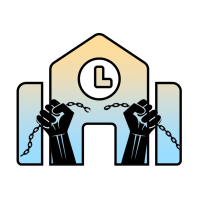End School Slavery Podcast: Difference between revisions
mNo edit summary |
mNo edit summary |
||
| Line 25: | Line 25: | ||
{{:ESS Podcast Episode 007}} | {{:ESS Podcast Episode 007}} | ||
{{:ESS Podcast Episode 008}} | {{:ESS Podcast Episode 008}} | ||
{{:ESS Podcast Episode 009}} | |||
Revision as of 11:28, 14 November 2021
Info

Listen to the End School Slavery Podcast at:
![]()
![]()
![]()
![]()
Guillem interviews people with a whole range of learning experience, especially in reference to compulsory schooling, bad school habits, free learning, and the pleasure of learning
Format
There is no set structure, duration or specific content. I do follow my ignorant curiosity resulting as an informal interview or debate. I would like to call it conversation rather than interview. I also respect the guest's privacy. That means I can edit out some parts, not recording the face, real name, etc.
If you want to participate in the podcast sharing your thoughts and experiences, please contact me or fill up this form and I will contact you.
Episodes
Episode 1: Alp Kaan from Turkey
Alp Kaan is a 18 year old student from Turkey who is about to finish the mandatory school system and shares his thoughts of his own experience.
Episode001
Episode 2: Axel, high school dropout now free learner from Bulgaria
Axel is a 23 year old free learner who dropped form high school at 17. He shares his thoughts of his own experience on both sides, the compulsory school and free learning.
Episode002
School Rebellion
- Urge to do something to show I don't want to be at school.
- Feeling fear at the beginning
- Notorious repetition of acts of rebellion -> teachers expected rebellion -> lessened the fear consequences to disobey authority.
- Key factor: reacting to the first rebellious student, emerging as leader, gave him a courage to start rebelling at school. Axel wouldn't started rebellion if nobody started in his class/environment.
- Many of classmates kept fearing the consequences.
- The home environment also plays a role.
- At that time they were not aware that was an act of rebellion. Instinctive reaction of the coercion.
- Way of rebellion: open math book in history class.
- The only good memories of school could actually happened at any place: hanging around with friends, making jokes, etc.
Learning
- We follow our learn drive without knowing we have a learn drive. Just like a child uses metaphors without knowing the concept of what a metaphor is.
- School was interfering with his learning. Axel wanted to learn programming.
- He was cutting his sleep in order to have some more time to study what he liked. School was taking too much of his time.
- He lied to his parents, as he knew they were reluctant to let him drop out of high school. He wanted to decrease their perception of risk of the uncertain consequences (success in life).
- Parental advise is often fear driven.
- Parents want good for their kids, their ignorance and
- Social pressure to get a high school diploma to get a well paid job.
Life
- His parents now are less worried as they see him healthy and not wasting his time.
- Axel made some life choices to spend more time free learning, exploring his areas of interest.
Episode 3: Axel, being cognizant of bad school habits
Second episode with Axel, we focus how he realized had habits acquired at school.
Episode003
Episode 4: Squid & End School Slavery
Squid is the creator of the End School Slavery Twitter account. He is a student and is fighting for his freedom.
Episode004
Tyler shares his startup idea to facilitate free learning in Taiwan.
Episode005
Episode 6: Discovering free learning while serving in the NAVY
Tyler shares how he discovered free learning while serving in the US Navy.
Episode006
Episode 7: Raj, from an ADHD student to a stoic utilitarian
Raj shares his experience in the school system taking medication for ADHD and how he discovered free learning.
Episode007
Episode 8: Discussing Bullying with Wasim
Wasim and I share our experiences with bullying in the school setting and exchange our perception on the topic.
Episode008
You attempt to define bullying at the start, but by 11th minute you did not mention the criminal effect of closed space schooling on the phenomenon of bullying! It is easy to walk out from a bully on the playground. Bullies get abandoned and make sorry figures. It is the school that puts kids together in a cage with no easy option out. This is the theft of freedom that stands at the core of bullying. There is no better expert on bullying than the victim, and yet even then it may be hard to model the phenomenon theoretically. No wonder then that a typical adult will blame bullying on bad kids without ever realizing that closed behavioral spaces breed bulling by the rules of game theory. Spontaneously and naturally. It is not the kids who are to be blamed. It is the system that inevitably trains the classes of human bullies and human victims.
PiotrWozniak
Same-sex bullying claim isn't always true. A small girl may be a victim of a bully boy just because she is easy to toss around. Other guys may have no inclination to bully, but may gradually be drawn in just because they need to be part of the pack. This is how closed systems naturally breed bullying. Moral code may take long to develop and is no protection in such cases (esp. for younger kids). Cultures just add different color to the same game. The game is inevitable
PiotrWozniak
Episode 9: What is the Intrinsic Valuable State with Axel
Axel and I discuss about what is the Intrinsic Valuable State?
Episode009
Script pending
